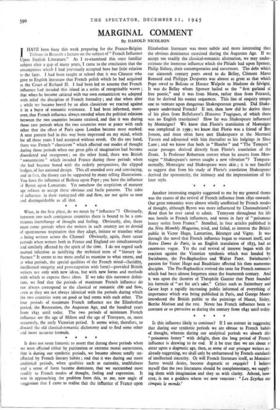It does not seem fantastic to assert that during those
periods when we were affected either by puritanism or extreme moral earnestness, that is during our synthetic periods, we became almost totally un- affected by French literary habits ; and that it was during our more analytical periods, when qualities such as curiosity, truthfulness and a sense of form became dominant, that we succumbed most readily to French modes of thought, feeling and expression. It was in approaching the problem from this, to me, new angle of suggestion that I came to realise that the influence of France upon
Elizabethan literature was more subtle and more interesting than the obvious dominance exercised during the Augustan Age. If we accept too readily the classical-romantic alternation, we may under- estimate the immense influence which the Pleiade had upon Spenser, Philip Sidney, their contemporaries and successors. The debt which our sixteenth century poets owed to du Bellay, Clement Marot Ronsard and Philippe Desportes was almost as great as that which Pope owed to Bolieau or Horace Walpole to Madame de Sevilpe. It was du Bellay whom Spenser hailed as the " first garland of free poesie," and it was from Marot, rather than from Petrarch, that he derived his sonnet sequences. This line of enquiry tempts one to venture upon dangerous Shakespearean ground. Did Shake- speare understand French? If not, then how did he derive three of his plots from Belleforest's Histoires Tragiques, of which there was no English translation? How far was Shakespeare influenced by Montaigne? We know that Florio's translation of Montaigne was completed in i599; we know that Florio was a friend of Ben Jonson, and must often have met Shakespeare at the Mermaid Tavern and adjourned with him thereafter to his lodgings in Shoe Lane ; and we know that both in " Hamlet " and "The Tempest " occur passages derived directly from Florio's translation of the Essais. Is Professor Robertson correct when he asserts from Mon- taigne " Shakespeare's nerves caught a new vibration"? Tempera- mentally, Montaigne and Shakespeare were akin ; it is not fanciful to suggest that from his study of Florio's translation Shakespeare derived the spontaneity, the intimacy and the impressionism of his later style.
** * * *






























 Previous page
Previous page